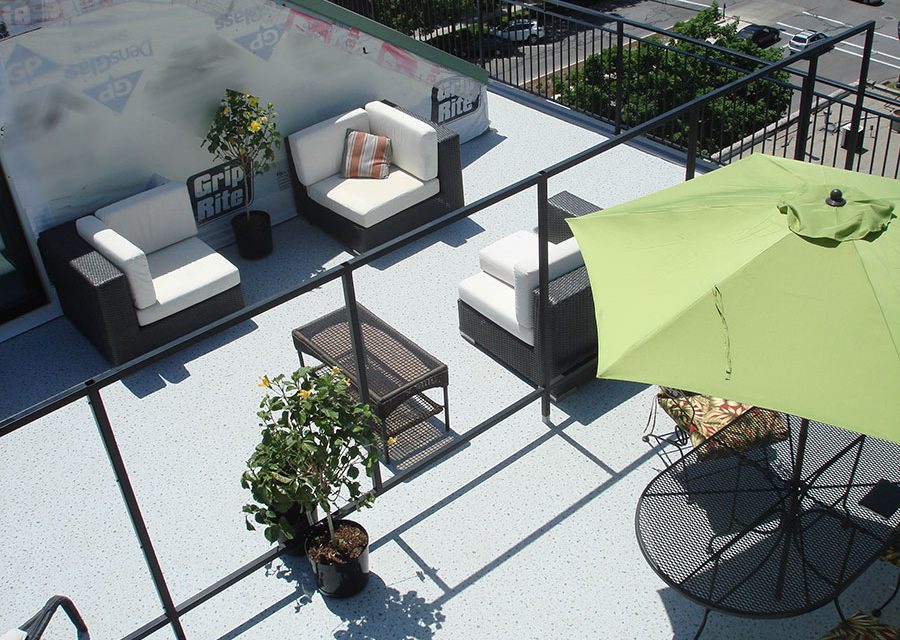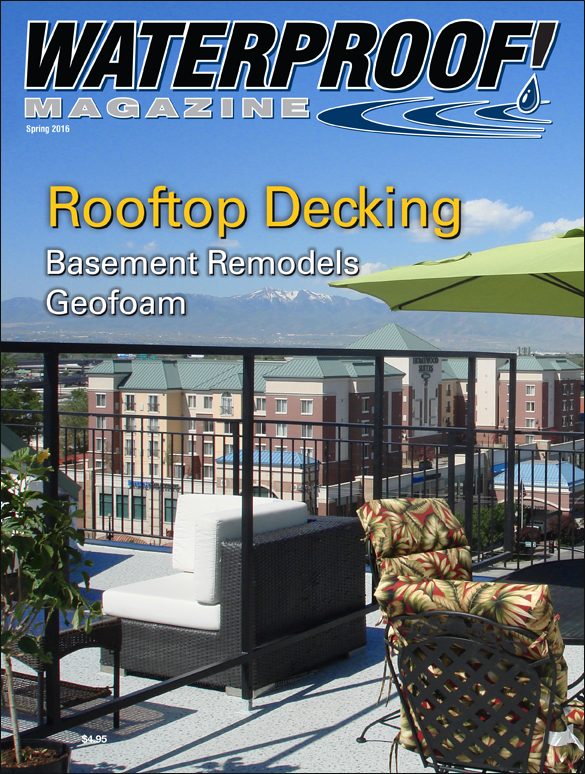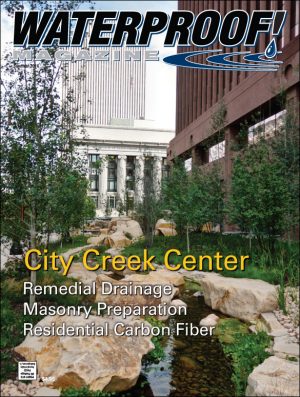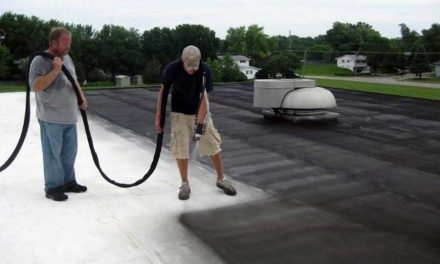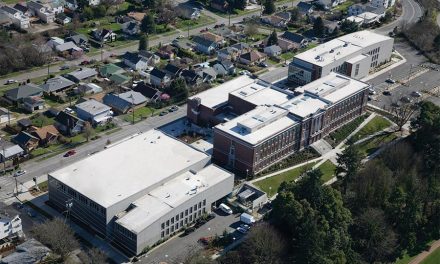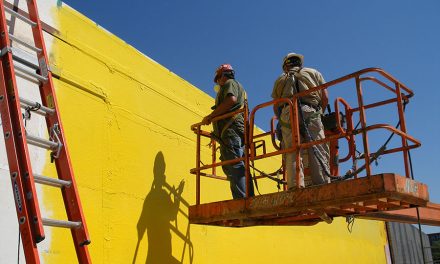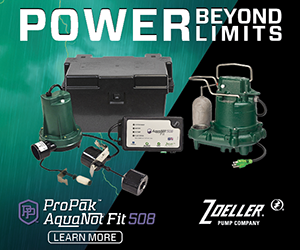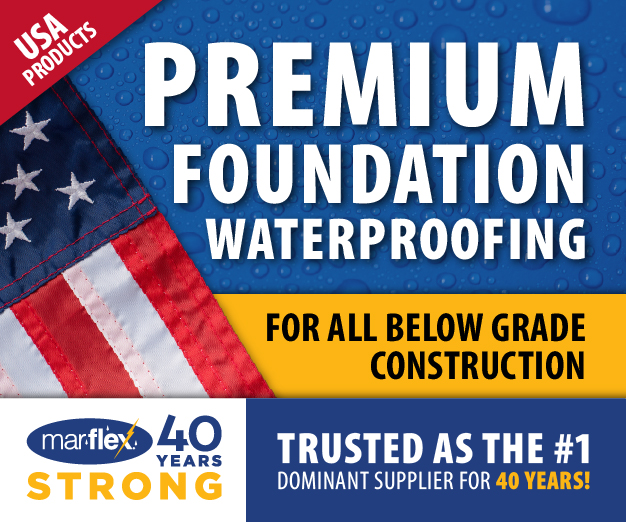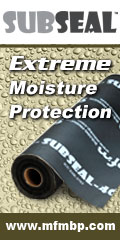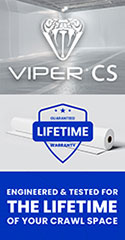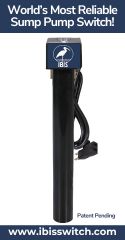One of the most difficult waterproofing scenarios for a roofer is creating a walkable rooftop deck over a wooden substrate.
Typically, it has minimal slope, so careful installation is required to avoid ponding. Railings and scuppers—which are the most frequent leak locations—must be carefully detailed. As an additional challenge, the coating must be able to withstand the abrasion of foot traffic and deck furniture. Further, because the substrate is prone to rot, the cost of failure can be astronomical.
Bill Leys, owner of Central Coast Waterproofing in California, says, “I see on a near-daily basis the results of water intrusion into wood framing, especially in mass-produced housing… That’s unfortunate because building a reliable, long-lasting waterproof deck over living space is relatively straightforward when the best practices and materials are used.”
A number of different waterproofing products work effectively to create decks of this type. Cementitious coatings, polyureas, and elastomeric coatings have all been used successfully. Depending on the size of the job and the product formulation, they can be spray-, roller-, or trowel-applied. A number of self-adhered membrane products are also available specifically for decking applications.

Single-ply vinyl membranes are durable and easy to apply. They’re also available in a wide range of colors and finishes.
But Leys points out that proper waterproofing involves far more than the membrane. “Get involved as early in the project as possible,” he recommends. This allows the waterproofer to ensure that framing meets code, the deck has adequate slope, and that scuppers and railings are accounted for. Leys recommends building it to be “as beefy as possible,” including thicker plywood sheathing. (OSB is not an approved substrate for deck waterproofing systems.) “My goal is to eliminate deflection,” he explains. He says the cost of additional lumber is a small price to pay in order to ensure the deck membrane doesn’t crack and leak from flexing.
Grant Lawton is the business development manager at Tuff Industries, manufacturer of decking waterproofing brands such as Tufdek and Econodek. He says building code requirements for decks have become more stringent. For example, the 2005 revisions to the National Building Code of Canada (NBC) included a clause that, “roofs shall include platforms that effectively serve as roofs with respect to the accumulation or drainage of precipitation. “Lawton explains, “The main thrust of the change is that all traditional waterproof deck areas are now defined as roofs. Previously, a waterproof deck was only required to meet roofing standards when installed over habitable space. The new code mandates that all materials used to waterproof a deck must comply with the roofing standards under the NBC.
In the U.S., walkable deck membranes should conform to AC39 Acceptance Criteria for Walking Decks, from the International Code Council.
Materials
A wide range of products are marketed for this purpose, each with its own advantages. Whatever system is chosen, it should be rated by the ICC-ES or comparable agency for the application it will be used for.
Cementitious coatings are similar to those used to seal pool decks. They’ll stand up to a tremendous amount of foot traffic, but require a deck substrate that is absolutely rigid to prevent cracking. Not all cementitious coatings are certified as a horizontal waterproofing product, but a few are. Leys’ preferred deck coating is Desert Crete, a multilayer cementitious coating applied over metal lath. “Over the past 12 years, we’ve successfully installed hundreds of thousands of square feet of it,” he says. “It can be finished with a spray-on texture or with various stamped concrete patterns, which can then be stained to mimic stone or tile.”
Polyurea coatings are made from the same stuff used for pick-up truck bed liners, so they can be extremely durable as well, but don’t offer the same range of finished looks.
Elastomeric coatings are much thinner than either of the above, only several times thicker than a coat of paint. They are one of the most economical product types but may not be as durable unless a wearing layer is installed over the top.

The Broadway Park Lofts include a private 300 sq. ft. roof deck, adding at least $40,000 of value to each unit.
Sheet goods, such as PVC (vinyl) are also popular, and are available in a wide range of colors and finishes. These systems have specific edge-finishing and flashing details.
Other sheet materials are available, but require a topcoat. For example, MFM’s SubSeal 60 is a self-adhered rubberized asphalt sheet suitable for use on plaza decks and balcony waterproofing. David Delcoma, product marketing manager at MFM says, “SubSeal is extremely tough and durable, and can withstand the extreme moisture present in these types of applications. However, it needs to be protected from abrasion and long-term UV exposure with something like concrete, tile, pavers, etc.”
Be aware that vinyl and urethane coverings require smooth sanded substrates free of defects. Alternately, voids and seams in the substrate can be treated with a patching compound. Cementitious coatings can be applied over Exterior Grade Exposure 1 panels.
Leys cautions, “While installation details vary slightly from product to product, none of them will last over the long term if the deck covering isn’t applied over a sturdy substrate.”
Value Added
A properly waterproofed deck can add significant value and profitability to urban real estate. The Broadway Park Lofts in Salt Lake City, Utah, is just one example. The high-end condominium development consists of two multi-story buildings, each with 41 units. Units on the top level include a private 300 sq. ft. roof deck that provides additional outdoor living space and panoramic views. Real estate agent Connor Southworth reports, “These units cost about $40,000 more than the middle floor units, [but are] well worth it in my opinion.”
Phase one of the development was built just as real estate prices tumbled, and when ClearWater Homes bought the property in 2012, the property had been vacant for three years. ClearWater Homes’ VP of strategy and development, Matt Kidd says, “Roof decks sometimes bring hesitancy to developers as there are so many considerations to constructing them properly. As these are situated over living space, a reliable walkable, waterproof surface is critical.”

Vinyl deck membranes require careful preparation and priming of the substrate (left) and meticulous attention to detail
when sealing seams (right).
For this project, they chose to go with the Duradek vinyl roof deck membranes. Kidd says, “Not only was Duradek a proven, reliable, warrantied solution for waterproofing the roof decks, but it also provided a low maintenance surface for the owners of the units since Duradek vinyl does not require any maintenance to continue performing…just an occasional cleaning to maintain its aesthetic appeal.”
The product has been used on all upper units built during phase two and three, and the response has been fantastic. Kidd says, “The value of having the rooftop deck is returned in spades for the home owner.” He reports there’s a long waiting list of potential buyers waiting for upper unit availability.
Duradek of Utah/Dekmax was asked to go back and re-do the decks on the original phase one units to ensure the entire project is trouble-free.
Kidd concludes, “Knowing that our rooftop decks not only provide a unique experience for our residents but a long lasting waterproof protection for their investments gives us the peace of mind to continue this development model for all of our communities going forward.”
Residential Peace of Mind
Decks are not just for urban areas. In Cleveland, Ohio, a homeowner recently faced the dilemma of how to best restore a rooftop deck on his beautiful historic home in the Shaker Heights District. As a prominent member of the city orchestra, the home is used extensively for entertaining and receptions. However the modified bitumen system had failed, rendering the deck unusable. Even worse, water from snow melt was causing damage to the structure and interior.
The contractor brought in to solve the problem, Stanfield Construction and Repairs, quickly realized the door thresholds were set close to the deck height, leaving minimal roof for a new membrane. He selected Tufdek, a vinyl roof deck membrane, which would provide a roof over the living space below, and a finished deck surface at the same time.

The failed roofing system and substrate was removed down to the rafters. Stanfield’s crew installed new PVC-clad metal scupper systems for drainage and proper flashings to eliminate leaks. Then, the vinyl system with an gray aggregate design was installed.
The owners are thrilled with the beautiful appearance and once again being able to use their deck as it was intended.
Spring 2016 Back Issue
$4.95
Rooftop Decking
Basement Remodels and Emergency Egress
Waterproofing and Geofoam
AVAILABLE AS DIGITAL DOWNLOAD ONLY
Description
Description
Rooftop Decking
These case studies outline the challenges and solutions to installing flat rooftop decking on both residential and commercial projects.
Basement Remodels and Emergency Egress
Basement contractors and waterproofers can increase profitability by adding egress installation to their services. Here’s how to make sure both the code and the owners’ budget are satisfied.
Waterproofing and Geofoam
Rigid EPS foam insulation is frequently found in roofing assemblies. But it can be encountered in a number of other waterproofing applications as well.
Additional Info
Additional information
| Magazine Format | Digital Download Magazine, Print Mailed Magazine |
|---|

